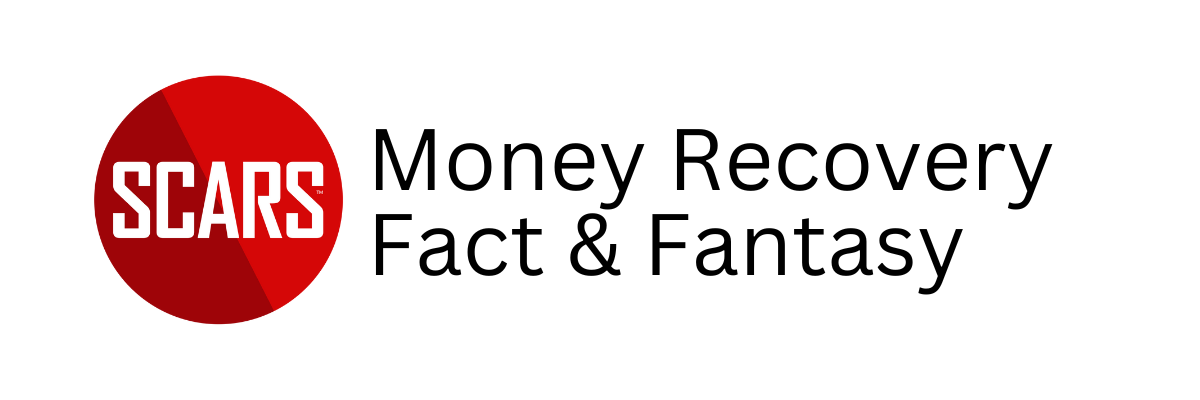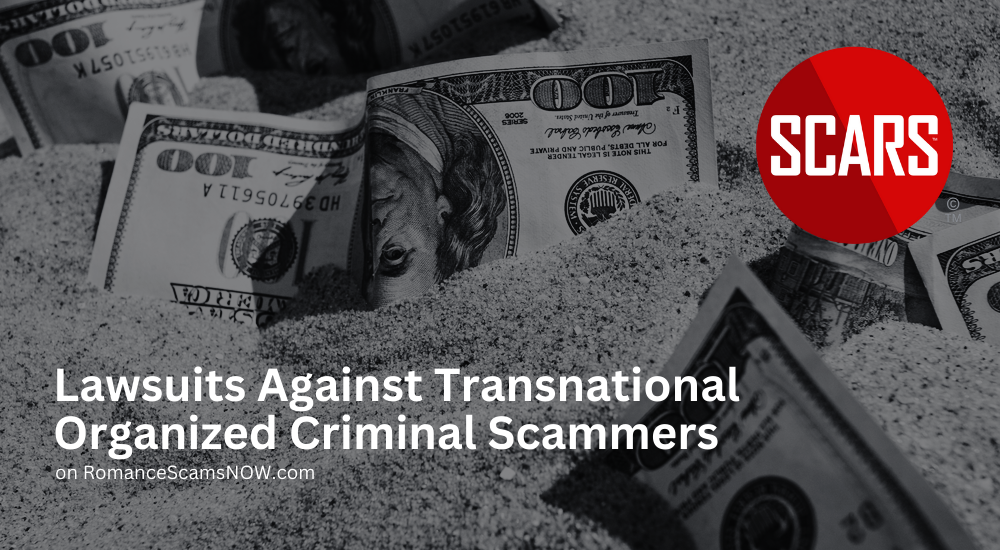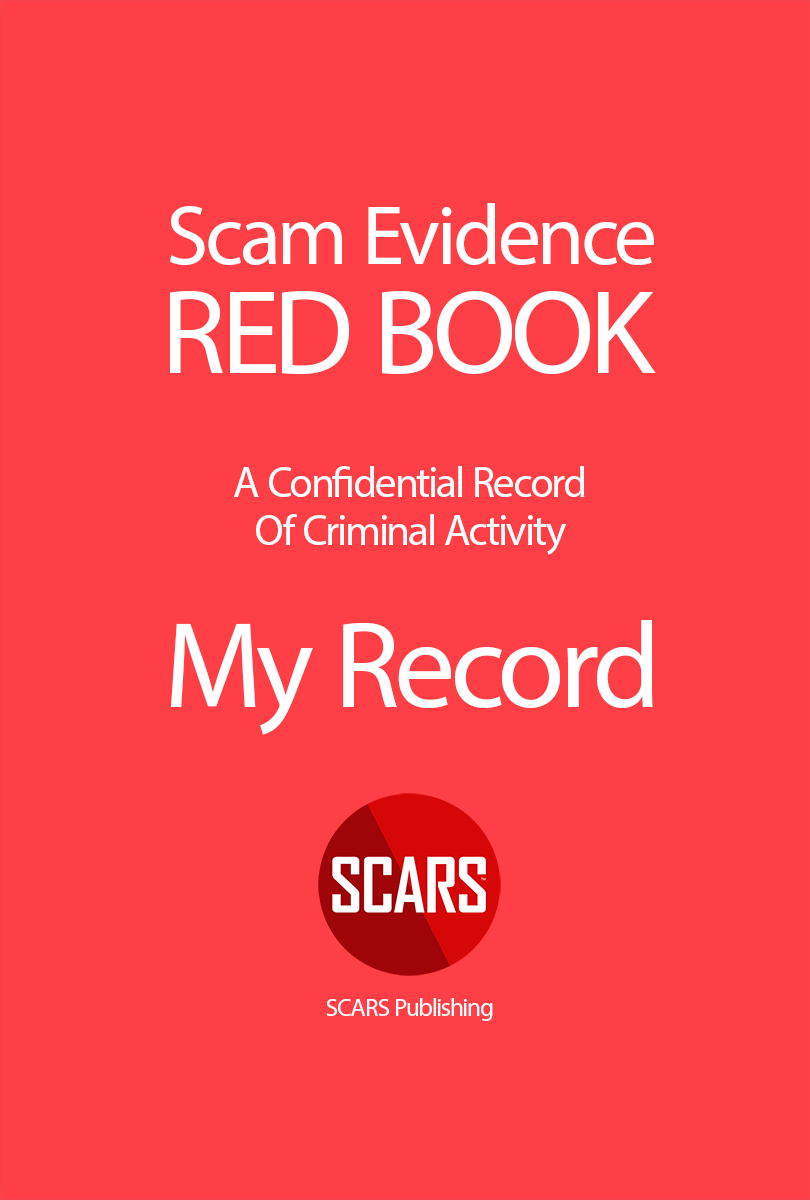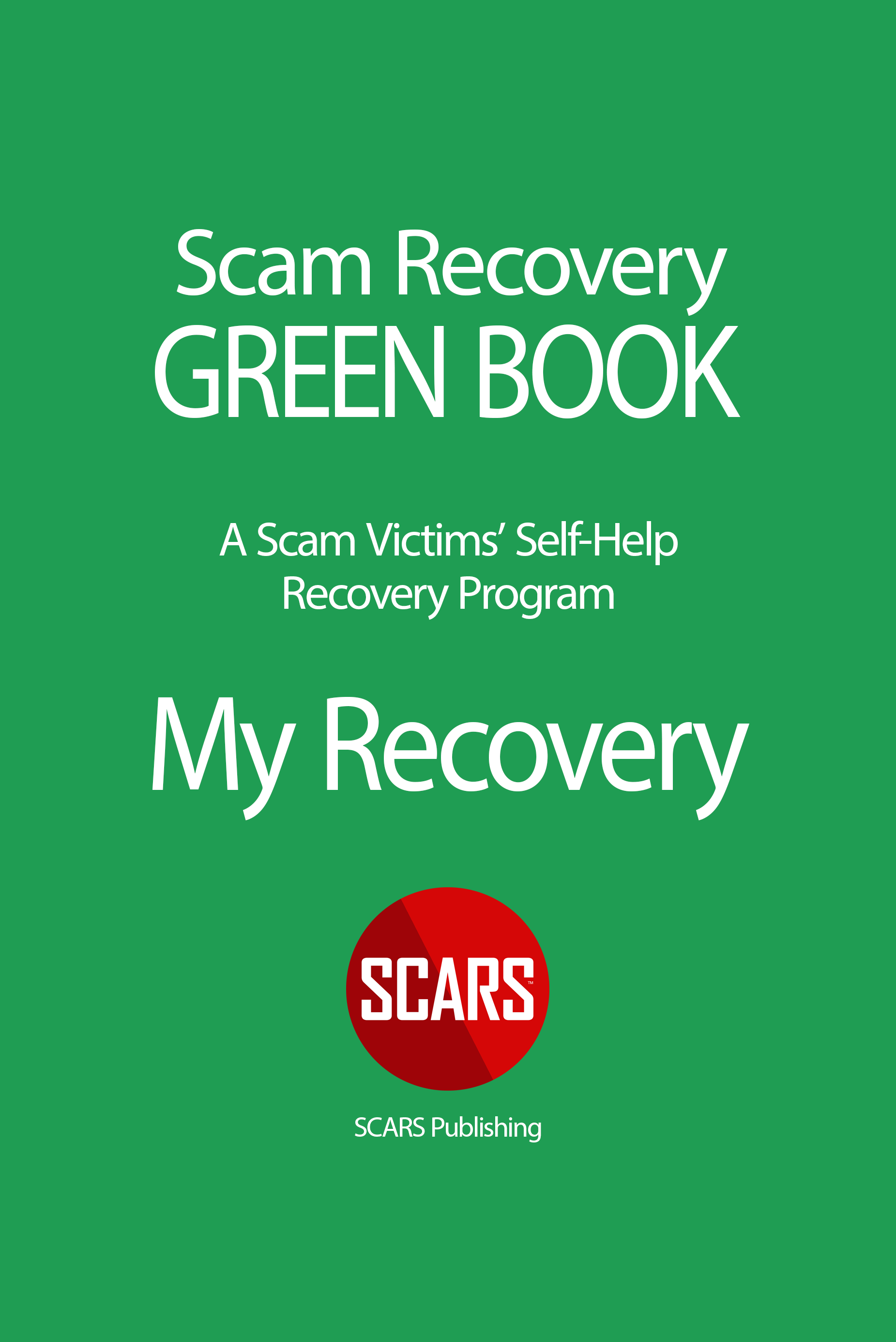Considering A Lawsuit Against A Transnational Organized Criminal Scammers
Unfortunately, When Desperation Strikes Any Idea Sounds Good
Money Recovery – A SCARS Insight
Author:
• Tim McGuinness, Ph.D. – Anthropologist, Scientist, Director of the Society of Citizens Against Relationship Scams Inc.
Article Abstract
Victims of trust-based relationship scams, such as romance or crypto investment scams, often find themselves in desperate situations after realizing they’ve been deceived. This desperation stems from significant financial losses and the emotional betrayal of trust.
Seeking justice and restitution, many victims turn to the idea of civil litigation, believing it to be the most viable path to recover their lost money. However, their desperation often leads them to make poor decisions, influenced by the cognitive bias known as ‘chasing the money’ or the ‘Sunk Cost Fallacy.’ This bias causes victims to continue investing time, money, and resources into recovery efforts despite diminishing returns.
They overestimate the success of legal remedies, driven by emotional turmoil and external encouragement. Despite the appeal of civil litigation, the process is complex, costly, and often fruitless, particularly in international cases. Therefore, victims must seek professional legal and emotional support to navigate these challenging circumstances effectively.
Disclaimer: Not Legal Advice
The information provided in this discussion/article is for general informational purposes only and does not constitute legal advice. It is not intended to be a substitute for professional legal counsel. Laws and regulations can be complex and subject to change, and the application of these laws can vary based on the specific facts and circumstances. Therefore, you should not act or rely on any information provided here without first seeking the advice of a professional licensed attorney in your jurisdiction. Only a qualified legal professional can provide advice tailored to your particular legal needs and situation.

A Lawsuit Against Transnational Organized Criminals/Scammers in Another Country – How Does That Work, and What Drives the Desperation to Attempt It
Desperation and Civil Lawsuits/Litigation: The Trust-Based Relationship Scam Victims’ Dilemma
Trust-based relationship scams, either romance scams or crypto investment scams, exploit the emotional vulnerabilities of individuals, leading them to part with significant amounts of money, which they are often desperate to recover by any means possible, including through lawsuits.
When the truth about the scam comes to light, victims frequently find themselves in a state of desperation. This desperation is not just about the financial loss but also about the betrayal and the shattering of trust. In their frantic quest for justice and restitution, many victims are dissatisfied with law enforcement, mostly because they do not understand that process, and turn to other ideas for how to recover their money.
They often turn to money recovery companies, lawyers, and even the idea of civil litigation (lawsuits,) believing it to be the most viable path to recover their lost money.
Unfortunately, that very desperation indicates that their mind is in no fit state to be making such decisions. All such money recovery strategies are mostly fantasies and a waste of money, but in more than half the cases yet another scam.
The Desperation to Recover Lost Funds
The realization that one has been scammed, especially through a relationship built on trust, can be profoundly distressing, a true betrayal. Victims often experience a range of intense emotions, including shock, fear, anger, shame, and guilt. The financial impact can be devastating, leading to significant life disruptions. In this state of desperation, the urge to take immediate action is strong – any action.
For some, civil litigation appears to be a tangible and structured way to seek redress, offering the promise of a legal resolution and the potential to recover lost money.
Cognitive Bias of Chasing the Money
In their pursuit of recovery, scam victims often fall prey to a mentality known as ‘chasing the money’. This mentality is based on a cognitive bias known as ‘Sunk Cost Fallacy‘ and manifests when individuals continue to invest time, money, and resources into recovering impossibly lost assets, despite diminishing returns or increasing costs. The emotional and financial investment already made into the scam creates a psychological commitment, making it difficult for victims to let go and accept the loss.
Key Aspects of Chasing the Money:
- Sunk Cost Fallacy: This is a key component of ‘chasing the money’, where individuals feel compelled to continue their efforts because of the resources they have already expended. With relationship scams, victims might pursue litigation because they have already invested substantial emotional and financial resources into the relationship and the initial attempts at recovery, and they are desperate to get their money back.
- Overconfidence in Legal Remedies: Victims often overestimate the likelihood of success in civil litigation, driven by the belief that the legal system will provide justice and restitution. This overconfidence can lead to further financial strain as they engage legal counsel and pay for court fees.
- Emotional Drivers: The emotional turmoil caused by the scam, including the need for closure and retribution, often clouds judgment. The pursuit of litigation becomes a way to channel their anger and hurt, even when the chances of recovery are slim or none.
- External Encouragement: Sometimes, victims are encouraged by well-meaning friends, family, or even other scam victims to pursue legal action. This external pressure can reinforce the belief that litigation is the correct path, further entrenching the chasing the money mentality.
The Reality of Civil Litigation
While civil litigation is a legitimate avenue for seeking justice, it is fraught with challenges, especially in international scams.
The complexities of filing lawsuits across borders, the difficulty in locating and serving defendants, and the cost of prolonged legal battles can be overwhelming. Furthermore, even if a judgment is obtained, enforcing it in another country can be an arduous and often fruitless endeavor.
If a person in the United States files a lawsuit against someone in Nigeria (for example,) it is possible, but it involves several steps and complexities due to international legal procedures involved. However, the odds of success are slim.
Here’s a step-by-step guide to how this process can be carried out:
Step 1: Determine Jurisdiction
-
- Evaluate Legal Grounds: Ensure that you have valid legal grounds for the lawsuit, such as breach of contract, fraud, or other actionable claims.
- Jurisdiction: Determine if U.S. courts have jurisdiction over the defendant. This can depend on factors like where the harm occurred, where the defendant conducts business, and if there are any contractual agreements specifying jurisdiction.
Step 2: Consult an Attorney
-
- Hire an Attorney: Find a U.S. attorney with experience in international law and litigation.
- Legal Advice: Obtain advice on the viability of your case and the best jurisdiction for filing the lawsuit.
Step 3: Research International Treaties and Laws
-
- Hague Service Convention: Check if both the U.S. and Nigeria are signatories to the Hague Service Convention, which facilitates the service of legal documents internationally.
- Local Laws: Understand Nigerian laws concerning the enforcement of foreign judgments and international legal cooperation.
Step 4: File the Lawsuit
-
- Draft the Complaint: Your attorney will draft a complaint outlining the legal basis for your lawsuit.
- File in the Appropriate Court: File the lawsuit in the appropriate U.S. court, typically a federal court if the case involves parties in different countries.
Step 5: Serve the Defendant
-
- Service of Process: Use appropriate methods to serve the Nigerian defendant with the lawsuit. If Nigeria is a Hague Service Convention signatory, follow its procedures. If not, service might be more complex and could involve diplomatic channels. Of course, you have to be able to find the criminal to be able to serve him/her/them.
- Proof of Service: Obtain proof that the defendant has been properly served according to international standards.
Step 6: Conduct Discovery
-
- Gather Evidence: Engage in the discovery process to gather evidence supporting your claims (unless you have everything needed, which is unlikely.) This can include depositions, requests for documents, and interrogatories.
- International Cooperation: Use international legal mechanisms, such as letters rogatory, to request assistance from Nigerian courts in gathering evidence.
Step 7: Trial and Judgment
-
- Trial Preparation: Prepare for trial with your attorney, including organizing evidence and witnesses.
- Trial: Attend trial and present your case. The court will issue a judgment based on the evidence presented. You will have to be physically present for the duration of the trial, which could be several months.
Step 8: Enforce the Judgment
-
- Domestic Enforcement: If the U.S. court rules in your favor, you will receive a judgment.
- Recognition and Enforcement in Nigeria: To enforce the U.S. judgment in Nigeria, you must go through Nigerian legal procedures. This typically involves filing a suit in a Nigerian court to recognize and enforce the foreign judgment.
- Nigerian Legal Representation: Hire a Nigerian attorney to assist with the enforcement process in Nigerian courts.
Step 9: Collect the Judgment
-
- Seize Assets: If the Nigerian court recognizes and enforces the judgment, you may be able to seize the defendant’s assets in Nigeria.
- Monitor Compliance: Ensure that the defendant complies with the judgment, which might involve further legal actions if they fail to do so.
Challenges and Considerations
-
- Complexity and Cost: International lawsuits can be expensive and complex, often requiring expertise in both U.S. and Nigerian law.
- Time-Consuming: The process can be lengthy due to the need for international cooperation and the different legal systems involved.
- Enforcement: Even with a favorable judgment, enforcing it in another country can be challenging.
By the way, you can also expect the criminals to sue you back! They can claim harassment, defamation, stalking, and a number of other laws against you. They just might win.
Filing a lawsuit against someone in Nigeria from the U.S. involves careful planning, legal expertise, and international cooperation. Consulting with attorneys experienced in international law from both countries is critical to navigating this complex process successfully.
The Reality
The reality is the idea of litigating with scammers is a very bad idea. All that will happen is that it will cost more money without any assurance that you can recover anything.
Summary
For trust-based relationship scam victims, the desperation to recover lost money can drive them to pursue civil litigation, often under the influence of the cognitive bias known as chasing the money (Sunk Cost Fallacy.) This bias leads victims to continue investing in recovery efforts despite the low probability of success, driven by emotional, psychological, and social factors. While seeking justice is important, it’s crucial for victims to approach the situation with a clear understanding of the challenges involved in civil litigation and to seek comprehensive support, including legal advice and emotional counseling, to navigate the aftermath of the scam effectively.
Important Information for New Scam Victims
- Please visit www.ScamVictimsSupport.org – a SCARS Website for New Scam Victims & Sextortion Victims
- Enroll in FREE SCARS Scam Survivor’s School now at www.SCARSeducation.org
- Please visit www.ScamPsychology.org – to more fully understand the psychological concepts involved in scams and scam victim recovery
If you are looking for local trauma counselors please visit counseling.AgainstScams.org or join SCARS for our counseling/therapy benefit: membership.AgainstScams.org
If you need to speak with someone now, you can dial 988 or find phone numbers for crisis hotlines all around the world here: www.opencounseling.com/suicide-hotlines
More Law Enforcement & Money Recovery
- Law Enforcement & Police – Article Catalog (romancescamsnow.com)
- Working With & Understanding Your Local Police (romancescamsnow.com)
- How To Effectively Follow Up – Scams and the Local Police (romancescamsnow.com)
- Police Investigation – How Do They Decide What Is Worth It? (romancescamsnow.com)
- Understanding Law Enforcement (romancescamsnow.com)
- Money Recovery: According To INTERPOL It May Not Be Too Late To Recovery Your Money [UPDATED] (romancescamsnow.com)
- Money Recovery & Investigative Scams Target Scam Victims [Updated] (romancescamsnow.com)
- Scam Victims Financial Survival & Money Recovery – Article Catalog 2023 (romancescamsnow.com)
SCARS Resources:
- Getting Started Right: ScamVictimsSupport.org
- Sextortion Scam Victims: Sextortion Victims Support – The Essentials (scamvictimssupport.org)
- For New Victims of Relationship Scams newvictim.AgainstScams.org
- Subscribe to SCARS Newsletter newsletter.againstscams.org
- Sign up for SCARS professional support & recovery groups, visit support.AgainstScams.org
- Join our Scam Survivors United Chat & Discussion Group facebook.com/groups/scam.survivors.united
- Find competent trauma counselors or therapists, visit counseling.AgainstScams.org
- Become a SCARS Member and get free counseling benefits, visit membership.AgainstScams.org
- Report each and every crime, learn how to at reporting.AgainstScams.org
- Learn more about Scams & Scammers at RomanceScamsNOW.com and ScamsNOW.com
- Scammer photos ScammerPhotos.com
- SCARS Videos youtube.AgainstScams.org
- Self-Help Books for Scam Victims are at shop.AgainstScams.org
- Donate to SCARS and help us help others at donate.AgainstScams.org
- Worldwide Crisis Hotlines: https://blog.opencounseling.com/suicide-hotlines/
Other Cyber Resources
- Block Scam Domains: Quad9.net
- Global Cyber Alliance ACT Cybersecurity Tool Website: Actionable Cybersecurity Tools (ACT) (globalcyberalliance.org) https://act.globalcyberalliance.org/index.php/Actionable_Cybersecurity_Tools_(ACT)_-_Simplified_Cybersecurity_Protection
- Wizer Cybersecurity Training – Free Security Awareness Training, Phishing Simulation and Gamification (wizer-training.com)
-/ 30 /-
What do you think about this?
Please share your thoughts in a comment below!
Do You Need Support?
Get It Now!
SCARS provides the leading Support & Recovery program for relationship scam victims – completely FREE!
Our managed peer support groups allow victims to talk to other survivors and recover in the most experienced environment possible, for as long as they need. Recovery takes as long as it takes – we put no limits on our support!
SCARS is the most trusted support & education provider in the world. Our team is certified in trauma-informed care, grief counseling, and so much more!
To apply to join our groups visit support.AgainstScams.org
We also offer separate support groups for family & friends too.
Become a
SCARS STAR™ Member
SCARS offers memberships in our STAR program, which includes many benefits for a very low annual membership fee!
SCARS STAR Membership benefits include:
- FREE Counseling or Therapy Benefit from our partner BetterHelp.com
- Exclusive members-only content & publications
- Discounts on SCARS Self-Help Books Save
- And more!
To learn more about the SCARS STAR Membership visit membership.AgainstScams.org
To become a SCARS STAR Member right now visit join.AgainstScams.org
To Learn More Also Look At Our Article Catalogs
Scam & Crime Types
More SCARS
- ScamsNOW Magazine – ScamsNOW.com
- ContraEstafas.org
- ScammerPhotos.com
- AnyScam.com – reporting
- AgainstScams.org – SCARS Corporate Website
- SCARS YouTube Video Channel















Leave A Comment